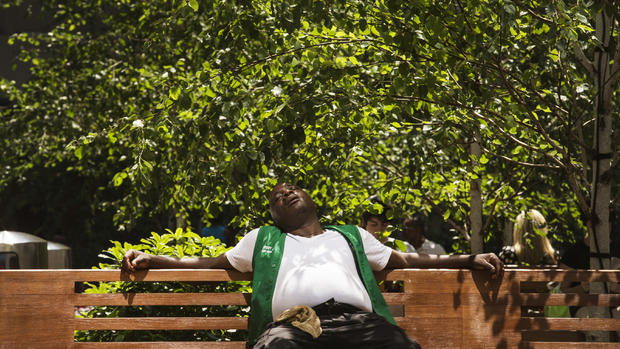Staying safe in a heat wave
With temperatures consistently topping 90 degrees Fahrenheit this week, it's important to know how to take care of yourself and your family in the extreme heat. It could save a life.
A June study from the Centers for Disease Control and Prevention found from 1999 through 2008, an average of more than 650 heat-related deaths occurred each year in the United States, with some groups more at risk than others.
CBS News chief medical correspondent Dr. Jon LaPook explains some of the symptoms of heat-related illness and how our bodies respond to such brutally hot weather.
How does the body stay cool?
Our bodies operate optimally within a small temperature range of about 97-100 degrees Fahrenheit. That's because we contain internal mechanisms that keep body temperature fairly regular. For example, when exposed to extreme heat, our blood vessels dilate and push blood to the skin where heat can escape. Evaporation through sweating helps lower the body's temperature.
But in extreme heat and without proper hydration the body cannot adequately cool itself. Without enough water, people can't produce a sufficient amount of sweat for bringing down body temperature. Potentially making the problem worse, a humidity of 75 percent or higher interferes with the body's normal sweating mechanism. This could put a person's health at risk.
How can you spot a heat-related illness?
Symptoms may be subtle at first and include nausea, fatigue, lightheadedness and headache. Untreated heat-related illness can progress to heat stroke with altered mental status, seizure, and even loss of consciousness. One clue of dehydration is urine may become more concentrated -- and therefore more yellow -- than usual, as the kidneys try to retain water. In infants, an unexpectedly dry diaper may indicate dehydration. At any age, severe dehydration can interfere with the normal production of sweat and tears.
Five life-saving tips for hot weather
- Pay close attention to the young and elderly, who are particularly susceptible to heat illness. Heat-related deaths occurred most frequently in adults 65 and older, according to the CDC.
- Do not leave kids, the elderly or pets in the car unattended. Twenty children have died in unattended vehicles this year.
- Be aware of your medications. Diuretics, ADHD prescriptions and cold medicines may inhibit the body's cooling mechanisms.
- Limit intake of caffeine and alcohol. An iced coffee or cold beer can increase the loss of water, via the kidneys.
- Know how much water to drink, especially for kids. Guidelines from the American Academy of Pediatrics suggest the following fluid replacement before, during, and after all sports: 3-8 ounces every 20 minutes for 9-12-year-olds and up to 1.0 to 1.5 liters an hour for adolescent boys and girls. Long-duration (one hour or longer) or repeated same-day sessions of exertion may warrant electrolyte-supplemented sports drinks.
The bottom line?
Use your common sense -- try to stay cool, hydrated and indoors as much as possible during a heat wave.
For more information, the CDC has tips for staying cool in extreme heat.
